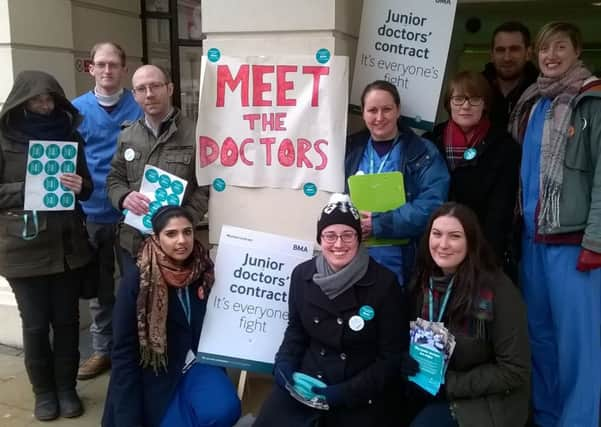Warwick Hospital's striking junior doctors tell their side of the story


The recent 48-hour strike, held on Wednesday March 9 and Thursday March 10, is the third instance of industrial action from junior doctors after protracted talks between the two parties.
The planned contract aims to increase basic pay for junior doctors by an average of 13.5 per cent, but will reduce what times are classed as unsociable working hours.
Advertisement
Hide AdAdvertisement
Hide AdMr Hunt is planning to impose the contract by Monday August 1 if a solution cannot be reached.


Warwick Hospital’s junior doctors were also part of the strike, and many gathered outside the Royal Priors shopping centre in Leamington from 2pm on the Thursday afternoon to speak to the public and tell their side of the story.
Dr Farah Mahmood, the BMA representative for Warwick, explained the reasons why the doctors decided to go on strike.
She said: “Essentially, we do not want this contract to be imposed. You can’t force a group of people to do something they don’t want to do.
Advertisement
Hide AdAdvertisement
Hide Ad“For us to stop striking, we just want to get the recognition we deserve.


“The future for us seems bleak, I’ve got to be honest. Strikes are the last thing any of us want to do, but we have to do everything in our power to make the government listen.”
Many of the doctors expressed fears that the new contract proposed by Mr Hunt would be dangerous both to patients and to the doctors themselves.
Dr Angela Coyle, 31, said: “The imposition of this contract is what I can only describe as barbaric - it’s just not safe.
Advertisement
Hide AdAdvertisement
Hide Ad“I’d hate to think how awful it would be when we get even less staff - I’m scared.”
Dr Lauren O’Flynn, 27, echoed Dr Coyle’s thoughts. She said: “What we need is more staff in different departments, not just more doctors. But the government aren’t willing to put the money in.
“I don’t care about the pay to be honest, it’s very much a safety issue to me.”
Dr Miriam Anderson, 29, said: “The main reason we’re going on strike is that we only just have enough doctors to cover the five-day elective service, and the new contract is only going to make things worse.
Advertisement
Hide AdAdvertisement
Hide Ad“I’d actually like to see my husband - we live together but we hardly see each other because I’m so busy.”
Dr Alison Bowen, 35, said: “It’s going to make our working lives unsafe. All we want is a safe and sustainable NHS.
“The government need to recognise that to have a seven-day NHS which provides elective care we need more staff, not just doctors.”
Another junior doctor who wished to remain anonymous said: “We need a better work-life balance. The strikes that we have held are safe strikes, it’s no different to weekend care.”
Advertisement
Hide AdAdvertisement
Hide AdMany onlookers stopped to talk to the doctors, and a significant portion of those people signed petitions in support of the doctors’ strike.
The doctors also expressed their desire for Jeremy Hunt to debate the BMA so he can be held to account and he can explain the contract he is trying to impose.
***
The junior doctors’ strikes all come down to the new contract the government is proposing, which the British Medical Association (BMA) believes does not provide ‘sufficient safeguards for junior doctors and their patients - either today or in the future.’
Addressing Parliament in February, health secretary Jeremy Hunt said the previous contract drawn up in 1999 was ‘not fit for purpose’ and criticised the BMA for not being flexible in previous negotiations.
Advertisement
Hide AdAdvertisement
Hide AdHe added: “The definition of a negotiation is a discussion where both sides demonstrate flexibility and compromise on their original objectives, and the BMA ultimately proved unwilling to do this.”
In November 2015, 98 per cent of junior doctors voted in favour of full strike action.
Although strikes planned by the BMA for December 2015 were called off, negotiations broke down on Monday January 4, leading to another series of strikes.
Future strikes are planned for Wednesday April 6 and Thursday April 7, as well as Tuesday April 26 and Wednesday April 27.